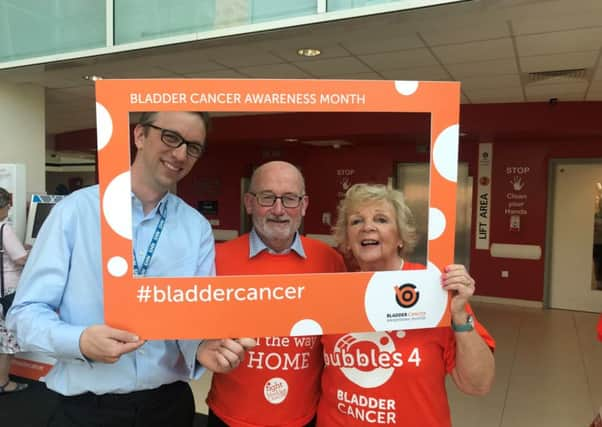BIG READ: Amazing machine saved my life from grip of '˜forgotten cancer'


After initially being treated for a urinary tract infection in March last year, Colin was given the heartbreaking news that he, in fact, had bladder cancer.
Colin says: ‘I went for a wee one day and noticed a tiny speck of blood, so I went to my GP and he referred me to the QA.
‘I had a cystoscopy and they could see two tumours.
Advertisement
Hide AdAdvertisement
Hide AdColin, father of a 29-year-old daughter, served in the Royal Navy for 33 years as a captain and head of the mine warfare and patrol vessels, fishery protection and diving in the Portsmouth Flotilla at the naval base.
‘I didn’t get any special treatment. I was admitted as an NHS patient and got the same treatment as everyone else,’ he stresses.
The 63-year-old, who lives with his wife in Petersfield, had both of the tumours in his bladder removed at QA and underwent six weeks of BCG therapy that was unfortunately unsuccessful.
He says: ‘My choices were bladder removal or for the cancer to spread which would’ve just given me a couple of years.’
Advertisement
Hide AdAdvertisement
Hide AdBladder cancer is the fifth biggest cancer in Europe, with someone being diagnosed with the disease every four minutes .
According to UK charity Fight Bladder Cancer, there have been no major breakthroughs in the treatment for over 40 years.
But, on March 23, Colin’s bladder, along with his prostate and nearby lymph nodes, were removed during a keyhole surgery using the publicly-funded Da Vinci Robotic System at QA.
‘I had five small incisions where the robot arms went in and it left just one small scar,’ Colin says.
Advertisement
Hide AdAdvertisement
Hide Ad‘Now I have a hole by my belly button where the urine comes out but it doesn’t really affect my life.
‘This is reality. I have this bag and I’m getting used to my new normal.’
The bag attached to Colin’s torso holds 500ml of urine before it needs to be emptied, similar to ‘going for a wee normally,’ he says.
‘I had to build up the confidence to go out, but I still have my senses and my dignity.
Advertisement
Hide AdAdvertisement
Hide Ad‘I have realised there are millions of people worse off than me.’
The £2.4m Da Vinci system is transforming surgery and recovery time at QA, as Colin spent just three days recovering in hospital.
But 18 months ago, before the hospital acquired the Da Vinci system, Colin would have had major surgery to remove his bladder.
‘They would have opened me up from my belly button to the top of my lungs,’ he says.
Advertisement
Hide AdAdvertisement
Hide AdThe recovery period for such an operation would be three weeks and the risk of infection while in the hospital would have been high.
There was a recognised need for the new system at QA to operate on more than just bladder cancer patients. And with help from the public and the hospital’s Rocky Appeal, enough money was raised to keep the Da Vinci robot in Portsmouth.
Thanks to the robot Colin has been left with one tiny scar and he is getting used to his ‘new normal’.
Colin goes on to praise the staff at the QA for their support.
Advertisement
Hide AdAdvertisement
Hide Ad‘My cancer journey is exceptional. The staff at QA are absolutely phenomenal,’ he says.
‘The culture at the hospital is one of a caring organisation.’
Queen Alexandra Hospital was named as the training centre for European surgeons in 2014 and is now teaching surgeons from all over the continent to operate using the Da Vinci robot.
‘It is fantastic that this is happening in Hampshire,’ Colin says.
Advertisement
Hide AdAdvertisement
Hide AdTo raise awareness of bladder cancer, the Emirates Spinnaker Tower was lit orange on May 20 to Shine a Light on the disease.
The founder of Fight Bladder Cancer, Andrew Winterbottom, who has also fought bladder cancer, says: ‘It is vital to raise awareness of this cruel disease. Shine a Light on Bladder cancer can make a big difference in raising awareness.’
Earlier this month, Colin spent two days at QA providing information to the public on bladder cancer.
He says: ‘People don’t like talking about those parts of the body, they feel uncomfortable.
Advertisement
Hide AdAdvertisement
Hide Ad‘It is really important that we do all we can to make people aware of this disease.
‘It is, in many ways, the forgotten cancer.’
ESSENTIALS
The hi-tech Da Vinci robot has helped save hundreds of lives since it arrived at QA in 2013.
The equipment is used to operate on hard-to-reach areas of the body using key-hole surgery, leaving smaller scars and a faster recovery.
It is used to treat patients with a variety of cancers, including bladder cancer, which is the fifth biggest cancer in the UK that affects both men and women at any age.
Advertisement
Hide AdAdvertisement
Hide AdFight Bladder Cancer is a UK charity working to raise awareness and funding for research into the disease.
They say there are more men living with bladder cancer but there is a rise in the number of women with the disease and late diagnosis can make the outcome worse.
The bladder, lymph nodes and prostate are removed in men with the cancer, and women sometimes require a full hysterectomy with their womb and ovaries being removed along with their bladder.
Blood in your urine is the most common symptom of bladder cancer, no matter how much or how frequent it appears.
‘Being aware of what the symptoms are is vital and people are advised to see their GP quickly if they see blood in their urine.’
n For more information, go to fightbladdercancer.co.uk.